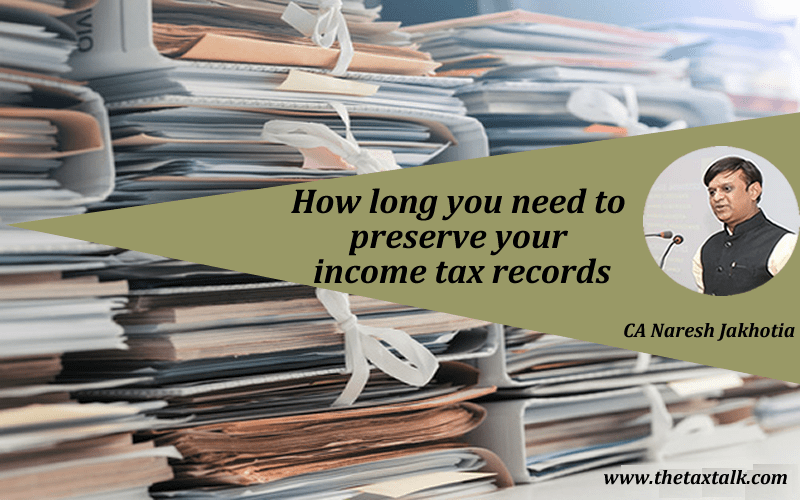![]()
How long you need to preserve your Income Tax records.
The minute you throw
something out that you haven’t looked at or touched for decades, you will need
it desperately- Universally
accepted human law
Filing of income tax return is not the only tax obligations. Taxpayers are duty bound to preserve pile of old documents in support of their income. With e-filing applicable to almost every classes of taxpayer, documents are no more required to be attached with the income tax return. Income Tax Department can demand records & evidences not only for current year but also for earlier years. This may include documents in support of basic deduction like u/s 80C, 80D, 80G to documents relating to agricultural income, expenses, etc. Not only businessmen & professionals, even salaried taxpayers are not immune from the requirements of preserving the records. How long taxpayer should preserve the documents is one of the most of the vital question by the taxpayers.
There is no specific clause in the Income Tax Act as to the time limit for preserving the records by salaried taxpayer & businessmen. However, the same has to be inferred from the power of authorities with regard to assessment & calling of information thereof. Section 149 of the Income Tax Act specifies the time limit for issuing an income tax notice to an individual which can be interpreted as the time period for which documents must be kept.
Income tax authorities have powers to issue notice for assessing income of the taxpayers up to seven years from the end of the relevant financial year. For example, for FY 2017-18 (AY: 2018-19), records are required to be retained till 31.03.2025. This period of 7 years is applicable to all the classes of taxpayers, be it individual, firm, trust or a company.
For any individual having income relating to a foreign asset or having a financial interest in any foreign entity, then such related documents has to be kept for 17 years from the end of the relevant financial years. By the Finance Act-2017, details up to 10 year old cases can be sought by the tax authorities in case of raid cases if it involves large amounts of escaped income exceeding Rs. 50 Lakh.
Even those who are not filing income tax return are also required to preserve the documents for 7 years (or 10 years or 17 years as the case may be) so as to justify that there was no obligation to file the return or there is no escapement of income on their part.
However there are three exceptions to above provisions:
- Where the taxpayers has filed an appeal against any assessment order of any year, then the books of accounts of such year should be preserved until the final decision of such appeal.
- Where the assessment in relation to any Year has been reopened u/s 147 within time u/s 149, then in such case all the books of account and documents shall continue to be kept till the assessment so reopened has been completed.
- Where the person who has entered in to an International or specified domestic transaction then the records of 8 years are required to be maintained.
Though not mandatory, it is advisablefor the Taxpayers to preserve the following documents/records even beyond thenormal period of 7 years:
1. Investment/Expenses documents related to construction, renovation, majorrepairs etc over the property.
2. Bills of Gems, Jewellery, ornaments,
Silver & other assets along with documentary evidences proving its source
of investment.
3. Loans & Advances given by the taxpayer to
anyone, recovery of which may take a period of more than 7 years as mentioned
above.


